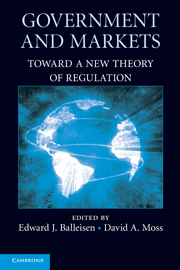Book contents
- Frontmatter
- Contents
- Acknowledgments
- Contributors
- Introduction
- SECTION I BEYOND MARKET FAILURE
- SECTION II BEYOND THE ECONOMIC THEORY OF POLITICS
- SECTION III BEYOND COMMAND AND CONTROL
- 10 What Opportunity Is Knocking? Regulating Corporate Governance in the United States
- 11 Taxation as a Regulatory Tool: Lessons from Environmental Taxes in Europe
- 12 Redesigning Regulation: A Case Study from the Consumer Credit Market
- 13 Origins and Regulatory Consequences of the Subprime Crisis
- 14 The Prospects for Effective Coregulation in the United States: A Historian's View from the Early Twenty-First Century
- 15 Deregulation Theories in a Litigious Society: American Antitrust and Tort
- 16 Markets in the Shadow of the State: An Appraisal of Deregulation and Implications for Future Research
- Conclusion
- Index
- References
14 - The Prospects for Effective Coregulation in the United States: A Historian's View from the Early Twenty-First Century
Published online by Cambridge University Press: 20 January 2010
- Frontmatter
- Contents
- Acknowledgments
- Contributors
- Introduction
- SECTION I BEYOND MARKET FAILURE
- SECTION II BEYOND THE ECONOMIC THEORY OF POLITICS
- SECTION III BEYOND COMMAND AND CONTROL
- 10 What Opportunity Is Knocking? Regulating Corporate Governance in the United States
- 11 Taxation as a Regulatory Tool: Lessons from Environmental Taxes in Europe
- 12 Redesigning Regulation: A Case Study from the Consumer Credit Market
- 13 Origins and Regulatory Consequences of the Subprime Crisis
- 14 The Prospects for Effective Coregulation in the United States: A Historian's View from the Early Twenty-First Century
- 15 Deregulation Theories in a Litigious Society: American Antitrust and Tort
- 16 Markets in the Shadow of the State: An Appraisal of Deregulation and Implications for Future Research
- Conclusion
- Index
- References
Summary
As just about any observer of the American political scene over the past thirty years can attest, traditional modes of economic regulation by administrative agencies fell sharply out of favor in the United States in the quarter century after 1975. In areas as various as transportation, workplace safety, the environment, banking, and labor standards, skepticism about regulatory agencies became a dominant premise of policy debates. The assumptions and precepts of public choice scholarship, so carefully laid out by Jessica Leight in her contribution to this volume, filtered into the conceptual assumptions of elected officials and leading political commentators alike. Politicians and governmental officials increasingly worried about the “capture” of public agencies by private interests, leading to the latter's unjust enrichment; they grew ever more disquieted by the possibility that regulatory action would produce unanticipated outcomes that would harm economic growth; they feared that the enduring shortcomings of government – venal officialdom and tangled bureaucracy – would hamstring regulatory responses to even substantial socioeconomic problems. Although the critiques of the regulatory state emanated most consistently from political conservatives and libertarians, as well as business groups that viewed particular regulatory regimes as antithetical to their interests, they significantly shaped the worldview of many moderates and liberals as well.
The most prominent consequence of the intellectual and political on-slaught against the administrative state has been deregulation – the selective dismantling of legal restrictions, mechanisms of governmental price/rate/fare setting, and systems of administrative monitoring that had previously structured market activity.
- Type
- Chapter
- Information
- Government and MarketsToward a New Theory of Regulation, pp. 443 - 481Publisher: Cambridge University PressPrint publication year: 2009
References
- 5
- Cited by



